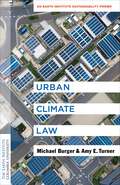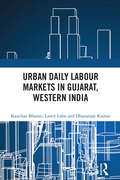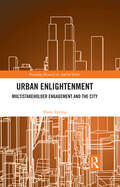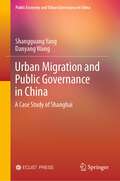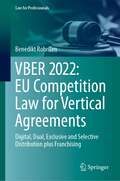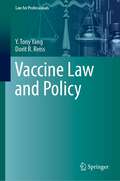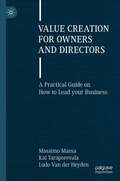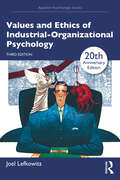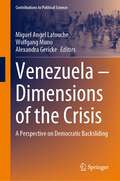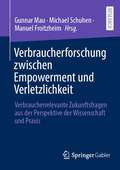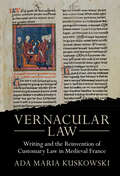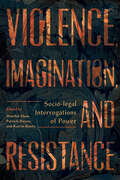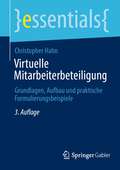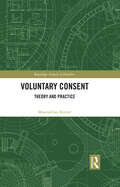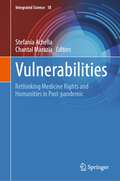- Table View
- List View
Urban Climate Law: An Earth Institute Sustainability Primer (Columbia University Earth Institute Sustainability Primers)
by Michael Burger Amy E. TurnerCities have taken a leading role in efforts to reduce greenhouse gas emissions. As federal and state climate policy waxes and wanes, many of the largest U.S. cities have pledged themselves to ambitious sustainability goals, as have smaller communities across the country. City-level policy makers, facing a range of political constraints, a thicket of federal and state laws, and varying degrees of municipal authority, need to figure out how to meet their climate commitments.Urban Climate Law is a practical, user-friendly primer on the legal challenges and opportunities for effective and equitable decarbonization. Michael Burger and Amy E. Turner—leading experts in local climate law and policy—examine the key issues surrounding climate mitigation policies across the buildings, transportation, waste, and energy sectors, with an emphasis on environmental justice. They explore the legal frameworks and factors that can constrain or enable various approaches at the municipal level. Burger and Turner clearly and accessibly present complex legal topics like preemption, federal statutes such as the Clean Air Act, and constitutional law for readers without legal backgrounds, including students, advocates, officials, and other practitioners. Aimed at a nonspecialist audience, this book provides concise and comprehensible answers to the core questions cities confront when seeking to develop legally sound local climate policy.
Urban Daily Labour Markets in Gujarat, Western India
by Dhananjay Kumar Kanchan Bharati LANCY LOBOThis volume explores one of the most complex labour landscapes of India - the urban daily labour market. These markets form an important sector of the urban informal labour market and contribute significantly to the Indian economy. This book presents an empirical, comparative picture of daily labour markets, in Gujarat, Western India. These markets consist mostly of intra-state and interstate migrant workers who suffer from layered multiple marginalities based on markers of informality, migrant status, caste, ethnicity, gender and poor agency and often live in the peripheries of the cities without any rights and entitlements to their spaces and services. This study, based on an extensive survey of three cities in Gujarat, contains descriptions and analyses of the places of migration and their causes as well as the working and living conditions of the workers along with their spending patterns on food, health, education and leisure. It mirrors the work, life and issues of these workers on the regional level while contributing to a better understanding for future policy interventions. An in-depth study, the book will be of interest to students and researchers of labour economics, labour studies, urban planning, social work, sociology, anthropology, and demography. It will also be useful to NGOs/trade unions working with migrant workers, civil servants in Labour department and other related departments, city planners and policy makers.
Urban Enlightenment: Multistakeholder Engagement and the City (Routledge Research in Applied Ethics)
by Shane EptingThis book applies the concept of moral ordering to urban affairs. It demonstrates how multi-stakeholder engagement can enhance the quality of city life while supporting ambitions such as ethical urban sustainability and human flourishing. While there is a history of philosophers viewing cities as technologies, cities’ encompassing nature inherently limits them. Urban sustainability matters often affect marginalized and vulnerable people, the public, nonhuman species, future generations, and urban artifacts. Problems can arise when stakeholders’ interests and needs appear at odds. The author argues in favor of the concept of moral ordering, a process designed to address issues involving different stakeholder groups such as municipal officials and residents. By employing moral ordering, a view comes into focus, revealing that the attention that each group receives reflects their place in the process, providing the necessary degree of moral respect. Finally, the author shows how moral ordering can lead to urban enlightenment. He examines real-world applications of moral ordering, such as New York City’s Participatory Budgeting Project, to make the case that municipalities can begin to bolster municipal-community relations in ways that promote urban enlightenment. Urban Enlightenment will appeal to researchers and advanced students working in philosophy of the city, applied ethics, philosophy of technology, urban planning, environmental studies, and political science.
Urban Migration and Public Governance in China: A Case Study of Shanghai (Public Economy and Urban Governance in China)
by Shangguang Yang Danyang WangThis book, focusing on urban migration and public governance, reviews on the concepts and theories of urban migration and urban governance across the globe and sums up world migration trends and policy changes, coupled with the characteristics and types of China’s urban migration. What differs this book from other books is that it probes into the main factors and mechanisms influencing urban migration and inclusion, and that it adopts Shanghai as a sample and capitalizes on Shanghai’s urban migration data to verify the subjective and objective reasons affecting urban migrants’ inclusion. Moreover, this book takes a further step to conduct a theoretical reflection from the perspectives of population migration and migration policies and explores current dilemmas facing China in terms of urban migration management and possible ways to make a difference. In the final part, this book puts forward some theory-based and practicable countermeasures to transform urban migration governance in China.
VBER 2022: Digital, Dual, Exclusive and Selective Distribution plus Franchising (Law for Professionals)
by Benedikt RohrßenThis book tackles the Vertical Block Exemption Regulation ("VBER"). The VBER 2022 is the new playbook in Europe for vertical agreements. Vertical agreements, i.e. between parties from different levels of the production or distribution chain, are ubiquitous in the EU economy. Vertical agreements which appreciably restrict competition are, in principle, void, and subject to fines. By exception, agreements may already fall outside the scope of competition law or may be exempt if their pro-competitive effects prevail. Whether they do or not requires an individual assessment of each agreement, with respective legal uncertainty. The VBER, however, is the shortcut to legally certain vertical agreements because it exempts groups of vertical agreements from the prohibition of anti-competitive agreements. It therefore builds the practical core of distribution law. Only understanding and implementing the VBER ensures a compliant distribution set-up. This goes for all kinds of vertical agreements, especially: digital, dual, exclusive and selective distribution plus franchise. The VBER 2022 is intended to take into account market developments, in particular the strong growth in e-commerce. Digitalisation has reinforced the trend toward verticalization – and thus toward dual distribution. The VBER 2022 now "reboots" the existing playbook, making it fit for digital distribution. And this book shall help – as a shortcut to understanding the VBER – to quickly and easily pass the transition to the new rules. This book is written from the distribution / contract drafting perspective. It is born out of the author’s practice as German attorney-at-law and partner in the international law firm Taylor Wessing. This book aims at providing private practitioners, in-house counsels as well as officers within authorities and judges practical guidance on the “rebooted” competition law regime in the European Union, including many examples of provisions to be used, especially in distribution and franchise agreements. It also tables and checklists for creating new and adapting existing agreements to the VBER. This book has been written while accompanying the reform discussions and the introduction of the VBER 2022 as an author, speaker and private practitioner.
Vaccine Law and Policy (Law for Professionals)
by Y. Tony Yang Dorit R. ReissVaccine Law and Policy is the first book on vaccine law and policy written specifically for the general public or an educated lay audience without legal background. It offers comprehensive but accessible coverage of key aspects of vaccine law and policy, from product development and intellectual property protections, to regulation, public mandates, and vaccine injury claims. The COVID-19 pandemic sparked a growing interest in learning more about vaccine law and policy, as vaccine development, access, safety and requirements became relevant to hundreds of millions of people worldwide. This book covers United States law in most detail, but the developments and trends described have parallels in many countries, and the United States model and its actions influence others. Some of the most widely used vaccines against COVID-19 - mRNA vaccines – were developed in the United States, and choices made in the United States impact other countries.United States law currently has so much to say about vaccines. From the federal mandate President Biden enacted requiring federal employees to be vaccinated against COVID-19, to the growing number of private employers requiring vaccines to return to work, vaccine law has become a prevalent topic in everyday life. But there is little writing about the legal aspects of vaccines directed at the general public or an educated lay audience without a legal background. Vaccine Law and Policy will not only be invaluable to professionals implementing vaccine law and policy, but also to regulators, public health officials, and scientific researchers.Vaccine Law and Policy covers the wide range of laws and policies that impact the field. These include, among others, regulatory oversight by the FDA, one of the most influential bodies in drug and vaccines regulation worldwide, enforcement, and regulation of the research and development of vaccines; vaccine mandates for children and in the workplace, and medical, religious, and philosophical exemptions to them; patent law and other intellectual property protections such as trademark, trade secret, unfair competition, and copyright law; compensation for vaccine injuries under the National Vaccine Injury Compensation Program (NVICP) and other avenues of liability; safety monitoring; access to vaccines, their promotion, and issues related to funding and costs. The book will also discuss issues related to anti-vaccine movements and vaccine advocacy.
Value Creation for Owners and Directors: A Practical Guide on How to Lead your Business
by Massimo Massa Kai Taraporevala Ludo Van der HeydenThis book deals with a much understudied and poorly understood aspect of business: the role of owners and boards in value creation. While there is abundant guidance on value creation for publicly listed firms and their managers, the role played by owners, and their corporate directors, in value creation and governance has been overlooked. This book aims to fill that gap. • The first part deals with the mission, and the values and rules pertaining to the governance of the business. These structural elements are fundamental for owners to get right as they pave the way to value creation, or its opposite. They refer to “WHAT” owners have to do. Another element is the formation of the three boards that govern owner-led firms: the owners board, the board of directors, and the management board. • The second part addresses the relational elements that owners must master to effectively manage the social and emotional dynamics in their enterprise. It deals with the “HOW” of ownership, namely the leadership process that lies at the heart of board work. This process ensures alignment across the three boards and also with stakeholders that is vital to realizing owners’ value creating aims. • Thirdly, the book explores the histories, defining experiences, and talents that define owners and shape their enterprise. It concerns the “WHOM,” namely the identities of owners. It explores the diversity of ownership styles and identifies the critical personal transitions owners must make in their leadership quest. This book offers a practical guide for business aiming for value creation. It also should be of interest to directors and executives of all firms with identifiable ownership, such as entrepreneurial, family, state-owned and private equity firms.
Values and Ethics of Industrial-Organizational Psychology (Applied Psychology Series)
by Joel LefkowitzThis foundational text was one of the first books to integrate work from moral philosophy, developmental/moral psychology, applied psychology, political and social economy, and political science, as well as business scholarship. Twenty years on, this third edition utilizes ideas from the first two to provide readers with a practical model for ethical decision making and includes examples from I-O research and practice, as well as current business events. The book incorporates diverse perspectives into a "framework for taking moral action" based on learning points from each chapter. Examples and references have been updated throughout, and sections on moral psychology, economic justice, the "replicability crisis," and open science have been expanded and the "radical behavioral challenge" to ethical decision-making is critiqued. In fifteen clearly structured and theory-based chapters, the author also presents a variety of ethical incidents reported by practicing I-O psychologists. This is the ideal resource for Ethics and I-O courses at the graduate and doctoral level. Academics in Organizational Behavior and Human Resource Management will also benefit from this book, as well as anyone interested in Ethics in Psychology and Business.
Values and Ethics of Industrial-Organizational Psychology (Applied Psychology Series)
by Joel LefkowitzThis foundational text was one of the first books to integrate work from moral philosophy, developmental/moral psychology, applied psychology, political and social economy, and political science, as well as business scholarship. Twenty years on, this third edition utilizes ideas from the first two to provide readers with a practical model for ethical decision making and includes examples from I-O research and practice, as well as current business events. The book incorporates diverse perspectives into a "framework for taking moral action" based on learning points from each chapter. Examples and references have been updated throughout, and sections on moral psychology, economic justice, the "replicability crisis," and open science have been expanded and the "radical behavioral challenge" to ethical decision-making is critiqued. In fifteen clearly structured and theory-based chapters, the author also presents a variety of ethical incidents reported by practicing I-O psychologists.This is the ideal resource for Ethics and I-O courses at the graduate and doctoral level. Academics in Organizational Behavior and Human Resource Management will also benefit from this book, as well as anyone interested in Ethics in Psychology and Business.
Venezuela – Dimensions of the Crisis: A Perspective on Democratic Backsliding (Contributions to Political Science)
by Wolfgang Muno Miguel Angel Latouche Alexandra GerickeThe book is devoted to the subject of Venezuela's politics and the different dimensions of its longstanding crisis, with various researchers exchanging ideas on the current problems affecting the country. It is the first comprehensive overview on the dimensions of Venezuela’s current crisis written in English, thus filling an important research gap. Especially the participation of international, well-known scholars make it a global enterprise. The book covers historical and theoretical facts surrounding the case of Venezuela and also focuses on the parties and actors that play decisive roles in the conflict. Subjects include the military, public administration, ideology, the opposition, the party landscape along with its crisis and Venezuela's oil policy. Furthermore the book touches upon international and regional aspects: Venezuela's diplomatic relations with the EU, the USA, Cuba and Colombia, respectively. The volume addresses a wider audience, such as scholars on Latin American and especially Venezuelan Politics, International Relations, as well as an interested public, including journalists and politicians.
Verbraucherforschung zwischen Empowerment und Verletzlichkeit: Verbraucherrelevante Zukunftsfragen aus der Perspektive der Wissenschaft und Praxis
by Gunnar Mau Michael Schuhen Manuel FroitzheimAR, KI, Digitale Sprachassistenten… die zunehmende Digitalisierung des Alltags und der Wandel unserer Lebensbedingungen stellt Verbraucher*innen vor neue Herausforderungen: Während die Möglichkeiten zur Information und Einflussnahme durch uns steigen, geben wir gleichzeitig immer mehr Entscheidungsgewalt an (smarte) Dritte ab. Werden wir als Verbraucher*innen also mächtiger – oder doch verletzlicher? Forschende unterschiedlicher Disziplinen haben sich dieser Frage angenommen und präsentieren in diesem Buch ihre Erkenntnisse zu verbraucherrelevanten Zukunftsfragen. Flankiert werden diese Erkenntnisse durch Beiträge von Praktiker*innen, die die wissenschaftlichen Erkenntnisse aus Anwendungsperspektive einordnen.
Verfahrens- und Prozessrecht in Amts-, Staatshaftungs- und Entschädigungsverfahren
by Peter Itzel Karin Schwall Bernd RohlfingDieses Buch hilft Fehler in Amts- und Staatshaftungsverfahren zu vermeiden und diese Verfahren ordnungsgemäß zu führen. Von der ersten Beratungssituation bis zur Vollstreckung werden die verfahrensrechtlichen Problemfelder dieses doch recht unübersichtlichen Haftungsbereichs systematisch dargestellt. Mit vielen Beispielen und Fällen aus der höchst- und obergerichtlichen Rechtssprechung werden Prozessrisiken mit den entsprechenden Lösungsmöglichkeiten praxisnah erläutert und effektive Hilfestellungen für die auf diesem Gebiet tätigen Praktiker (wie Rechtsanwälte, Verwaltungsjuristen, (Kommunal-) Versicherer) gegeben.
Verfahrensprivilegierung aus Gründen des Gemeinwohls: Eine rechtsvergleichende, systematisierende Betrachtung deutscher und französischer verwaltungsverfahrensrechtlicher Regelungen am Beispiel eines Netzboosters (Schriftenreihe des Instituts für Klimaschutz, Energie und Mobilität)
by Ilka DörrfußDiese Arbeit beleuchtet die verfahrensrechtliche Förderung von klimaschutzfreundlichen Projekten, die dem besonders dringenden Infrastrukturausbaubedarf abhelfen können. Dazu untersucht die Autorin die im deutschen und französischen Recht bestehenden Verfahrensprivilegierungen aus Gründen des um daraus Schlüsse für eine Verbesserung der Gesetzgebung zu ziehen. Im Mittelpunkt der Betrachtung steht das im Rahmen einer Novelle zum Energiewirtschaftsgesetz im Jahr 2019 geregelte Verfahren zur Genehmigung sogenannter Netzbooster. Dies sind große Batteriespeicher, die Schwankungen im Stromnetz kurzfristig ausgleichen sollen. Von Bedeutung sind Netzbooster nicht zuletzt im Zusammenhang mit dem Ausbau der Windenergie. Der Band analysiert und systematisiert mittelbare und unmittelbare Verfahrensprivilegierungen im Umwelt- und Planungsrecht und weist auf Handlungsspielräume und Nachbesserungsmöglichkeiten für den Gesetzgeber hin. Den Schwerpunkt im französischen Recht legt die Autorin auf die Commission nationale du débat public (CNDP) und die von ihr organisierte Öffentliche Debatte ( débat public) sowie auf das beschleunigte Enteignungsverfahren aus Gründen des Gemeinwohls ( L'expropriation pour cause d'utilité publique en extrême urgence). Der Rechtsvergleich liefert Grundlagen für eine Reformdiskussion.
Vergütung, Nachträge und Abrechnung nach Ansprüchen: Entscheidungshilfen für Auftraggeber, Planer und Bauunternehmer (Bau- und Architektenrecht nach Ansprüchen)
by Christian Zanner Markus G. Viering Birthe SaalbachKaum ein Bauprojekt wird ohne einen bzw. mehrere Nachträge abgeschlossen. Wie erstelle ich diese? Wie prüfe ich sie? Welche Anspruchsgrundlagen gibt es dazu? Was sind eigentlich tatsächlich erforderliche Kosten, wann sind sie maßgebend und wie werden sie ermittelt? Diese und zahlreiche weitere Fragen stellen sich nicht nur die erfahrenen Baupraktiker, sondern auch diejenigen, die am Beginn ihrer Karriere stehen oder die gar noch studieren.Praxisnah und umfassend werden die aus einem Bauvertrag – gleich ob nach VOB/B oder BGB – resultierenden Rechte und einschlägigen Regelungen von den Herausgebern und Mitautoren aus den unterschiedlichen Disziplinen der Bau-Juristerei und den Ingenieurwissenschaften dargestellt. Besonders anschaulich werden die Inhalte durch Ablaufdiagramme und Grafiken vermittelt. Beispiele und Praxistipps machen diese Publikation zu einem hilfreichen Nachschlagwerk für die tägliche Nutzung.
Vernacular Law: Writing and the Reinvention of Customary Law in Medieval France (Studies in Legal History)
by Ada Maria KuskowskiCustom was fundamental to medieval legal practice. Whether in a property dispute or a trial for murder, the aggrieved and accused would go to lay court where cases were resolved according to custom. What custom meant, however, went through a radical shift in the medieval period. Between the twelfth and thirteenth centuries, custom went from being a largely oral and performed practice to one that was also conceptualized in writing. Based on French lawbooks known as coutumiers, Ada Maria Kuskowski traces the repercussions this transformation – in the form of custom from unwritten to written and in the language of law from elite Latin to common vernacular – had on the cultural world of law. Vernacular Law offers a new understanding of the formation of a new field of knowledge: authors combined ideas, experience and critical thought to write lawbooks that made disparate customs into the field known as customary law.
Vertragsanbahnungs- und Vertragsabrechnungsmodelle im Kfz-Leasing (Bibliothek des Bank- und Kapitalmarktrechts #8)
by Marlene Franziska KowerkDieses Buch bietet eine umfassende Darstellung und Analyse zu den Besonderheiten des sogenannten Eintrittsmodells beim Kfz-Leasingvertrag und dessen Abrechnung in verschiedenen Beendigungssituationen.In drei Teile gegliedert beschäftigt sich das Buch im ersten Teil zunächst mit verschiedenen Konstellationen der Anbahnung des regelmäßig als drei-Parteien-Konstrukt ausgestalteten Leasinggeschäfts. Nach Vorstellung und Analyse der gängigen Vertragsanbahnungsmodelle geht die Verfasserin im weiteren Verlauf auf die Durchführung des Leasignvertrags sowie den Umgang mit Pflichtverletzungen ein. Der Leser erhält dabei erstmalig in diesem Detail einen anhand des Vertragszyklus orientierten Überblick zu den maßgeblichen Unterscheidungsmerkmalen zwischen zwei in der Praxis weit verbreiteten Modellen des Kfz-Finanzierungsleasings, dem Vorverhandlungs- und dem Eintrittsmodell.Dem Vertragszyklus weiter folgend wird in Teil 2 des Buches die auf die Vertragsbeendigung folgende Abrechnung des Leasingvertrags nach den unterschiedlichen in der Praxis verbreiteten Abrechnungsmodellen, insbesondere dem Kilometerabrechnungsvertrag und dem Leasingvertrag mit Restwertabrechnung, untersucht. Dabei stellt die Verfasserin die Besonderheiten des jeweiligen Abrechnungsmodells orientiert an den verschiedenen in Betracht kommenden Beendigungssituationen dar.Das Buch schließt in Teil 3 mit einer zusammenfassenden Bewertung der Untersuchungsergebnisse ab. Dabei zeigt die Verfasserin Lösungsvorschläge zu den von ihr herausgearbeiteten verbesserungsbedürftigen Punkten auf und geht hier auf u.a. mögliche Anpassungen der allgemeinen Leasingbedingungen sowie auf das Erfordernis weiteren gesetzgeberischen Handlungsbedarfs ein.
Verwaltungswissenschaft: Band 1: Theoretische und methodische Grundlagen
by Eberhard BohneDas Buch bietet eine Einführung in die Verwaltungswissenschaft. Das Buch richtet sich an Studierende aller Fachrichtungen, die sich mit Problemen der öffentlichen Verwaltung befassen, sowie an alle Angehörigen von Verwaltungsberufen innerhalb und außerhalb des öffentlichen Dienstes.
Verwaltungswissenschaft: Band 2: Grundzüge der öffentlichen Verwaltung in Deutschland
by Eberhard Bohne Christian BauerDas Lehrbuch enthält den Besonderen Teil der Verwaltungswissenschaft und knüpft an Bd. 1 mit dem Allgemeinen Teil an. Das Lehrbuch gibt einen systematischen, interdisziplinären Überblick über Aufgaben, Handlungsformen und Organisation, den Öffentlichen Dienst sowie über das Finanz- und Haushaltswesen der öffentlichen Verwaltung in Deutschland. Ausgehend von dem Rollenverhältnis des Bürgers gegenüber der öffentlichen Verwaltung, stellt das Lehrbuch die Haupttypen der öffentlichen Verwaltung dar – Polizei und Ordnungsverwaltung, Wirtschaftsaufsicht, Umweltaufsicht, Leistungsverwaltung, Infrastrukturverwaltung und Ko-Produktion öffentlicher Leistungen durch Bürger und öffentliche Verwaltung. Die Darstellung verbindet eine ökonomische, politische und rechtliche Perspektive. Bd. 1 und 2 bilden zusammen ein umfassendes, systematisches Kompendium der Verwaltungswissenschaft für Studium, Lehre und Praxis.
Verwertung kommerzieller Rechte im Sportmarketing: Theorieüberblick und Praxiseinblick
by Andreas BergmannIn diesem Lehrbuch lernen Sie die Grundlagen der Sportvermarktung sowie verschiedene Ausprägungen und Erscheinungsformen der Verwertung gewerblicher Rechte im Sport kennen. Anhand zahlreicher Praxisbeispiele, Statistiken und Studienergebnisse bekommen Sie eine realistische Vorstellung von der Größenordnung, in der sich die Sportvermarktung in Deutschland und weltweit bewegt und welche Anwendungsfälle in diesem Sektor von Relevanz sind. Des Weiteren lernen Sie die theoretische Verortung der Sportvermarktung aus Management- bzw. Marketing- und Kommunikationssicht kennen und können sich mit den rechtlichen Hintergründen vertraut machen. Insgesamt erhalten Sie mit diesem Lehrbuch ein breites Grundlagenwissen zum Thema Sportvermarktung.
Violence Never Heals: The Lifelong Effects of Intimate Partner Violence for Immigrant Women (Anthropologies of American Medicine: Culture, Power, and Practice)
by Allison BloomExplores experiences with disability and aging for immigrant survivors of domestic violence across thelife courseAcross the United States, one in three women experiences violence in their intimate relationships. More resources are now being devoted to providing these women with immediate care; but what happens to survivors, especially those from marginalized communities, as they grow older and grapple with the long-term effects? In Violence Never Heals, Allison Bloom presents a life-course perspective on the disabling experience of violence in Latina immigrant communities.Drawing on extensive ethnographic fieldwork performed in a Latina program at an Intimate Partner Violence (IPV) crisis center, Bloom offers insights into the long-term effects of systemic and gender-based violence, revealing that these experiences become subtly disabling long before old age. Drawing from her own background as a practitioner, Bloom further details how current IPV services fail to acknowledge and accommodate such effects, in large part because of their disproportionate focus on younger survivors and the particular development of the domestic violence services field. She offers both scholars and practitioners concrete strategies for how they can alter their approaches to better treat and mitigate the lifelong effects of domestic violence. Violence Never Heals addresses a glaring omission in IPV scholarship, providing both an aging-focused perspective on IPV as well as laying out concrete steps for how to implement this perspective in pursuit of more comprehensive treatment.
Violence in Extreme Conditions: Ethical Challenges in Military Practice
by Eric-Hans Kramer Tine MolendijkAs an organization operating under extreme conditions, the military is often confronted with destructive behavior from individuals, organizations, and societies. Written by experts from a variety of disciplines, this open access book reflects on confrontations with violence under extreme conditions and the various challenges that arise.By examining real first-hand accounts of soldiers’ deployments, the contributions shed new light on the multifaceted and sometimes hidden dynamics of destructive violent behavior and offer an ethical reflection on military practices. In addition, they address topics such as moral decision-making in violent contexts, military trauma, organizational change, and military ethics education.The interdisciplinary exploration of these topics has been the primary focus of Désirée Verweij, who was the Chair of Military Ethics at the Netherlands Defence Academy from 2008 to 2021. The contributions in this book are written in honor of her scholarly achievements and help to ensure that these important issues continue to receive attention. The book will appeal to scholars of military studies, organizational studies and military ethics, and to professionals and decisionmakers in military organizations.
Violence, Imagination, and Resistance: Socio-legal Interrogations of Power
by Katrin Roots Mariful Alam Patrick DwyerMuch of the discussion of social transformation and resistance in socio-legal studies centres around the question of whether and how the law can be used to achieve practical change. However, the editors of this volume argue that it will never be possible to enact change through the law because it is inseparable from violence, be it metaphysical, social, or political. They posit that a “just world,” free from oppressive power relations, requires us to imagine communities where the state and its law cease to exist. Contributors address the underexplored questions of what alternatives to law could look like: how communities could organize their everyday lives, and how they could address social and interpersonal conflicts outside of an apparatus of violence. These essays contribute to the ongoing interrogation of settler colonialism, racism, and structural violence in Canada by demonstrating how to expose the violence the law produces, how to deconstruct law’s power, and, finally, how to identify modes of resistance that have transformative potential.
Virtuelle Mitarbeiterbeteiligung: Grundlagen, Aufbau und praktische Formulierungsbeispiele (essentials)
by Christopher HahnDas essential vermittelt einen Einblick in den Aufbau, die Funktionsweise und typische Regelungen eines „Virtual Stock Option Plan“ (VSOP) zur Mitarbeiterbeteiligung. Der Autor erläutert die Bedeutung der Mitarbeiterbeteiligung als Bestandteil einer zeitgemäßen Unternehmenskultur sowie deren Notwendigkeit für junge wie etablierte Unternehmen, um die talentierten, qualifizierten und leistungsbewussten Mitarbeiter zu halten und zu binden. Das essential enthält zahlreiche Formulierungsbeispiele, die die Umsetzung in die Praxis erleichtern. Die 3. Auflage wurde dabei vollständig überarbeitet und aktualisiert. Aktuelle Neuerungen in der Praxis und Gesetzgebung wurden aufgenommen und werden erläutert.
Voluntary Consent: Theory and Practice (Routledge Annals of Bioethics)
by Maximilian KienerVoluntariness is a necessary condition of valid consent. But determining whether a person consented voluntarily can be difficult, especially when people are subjected to coercion or manipulation, placed in a situation with no acceptable alternative other than to consent to something, or find themselves in an abusive relationship. This book presents a novel view on the voluntariness of consent, especially medical consent, which the author calls Interpersonal Consenter-Consentee Justification (ICCJ). According to this view, consent is voluntary if and only if the process by which it has been obtained aligns with specific principles of interpersonal justification. ICCJ is distinctive because it explains voluntary consent neither as a ‘psychological’ concept indicative of the inner states of a person’s mind (e.g. willingness or reluctance) nor as a ‘circumstantial’ concept indicative of a person’s set of options. Rather, ICCJ explains the voluntariness of consent as an ‘interpersonal’ concept requiring the absence of illegitimate control within the interaction between the person giving consent and the person receiving it. In so doing, ICCJ further develops the notion of interpersonal justification, known from contractualist theories in moral philosophy, and introduces it to the debate on consent. The author employs a top-down approach, defending ICCJ’s key characteristics on the basis of general theoretical arguments, as well as a bottom-up approach, supporting ICCJ in its application to clinical challenges such as nudging and manipulation, living organ donation, and clinical trials. Voluntary Consent will appeal to researchers and advanced students in normative ethics, bioethics, philosophy of law, behavioural psychology, and medicine.
Vulnerabilities: Rethinking Medicine Rights and Humanities in Post-pandemic (Integrated Science #18)
by Stefania Achella Chantal MaraziaDrawing from a wide array of disciplinary perspectives and geographical contexts, this volume offers new insights for critically engaging with the problem of vulnerability. The essays here contained take the move from the COVID-19 pandemic, in order to explore the inherent vulnerability of individuals, but also of social, economic and political systems, and probe the descriptive and prescriptive import of the concept.Each chapter provides a self-contained perspective on vulnerability, as well as a specific methodological framework for questioning its meaning. Taken together, the chapters combine into a multi-disciplinary toolkit for approaching the various forms and structures of vulnerability, with a special attention to the intersectional factors shaping the individual experience of it: from gender to age, from disability to mental illness, from hospitalisation to incarceration. The book explores the theoretical richness and complexity of the concept and proposes new analytical approaches to it, before illustrating its multifariousness through empirically grounded case studies. The closing section engages with “the future of vulnerability”, as a hermeneutic, epistemological, and critical-normative perspective to be deployed beyond the domain of global crises and emergencies.The volume is primarily intended as a reference for scholars in the human, social and health sciences. The accessible structure and plain language of the chapters make it also a valuable didactic resource for graduate courses in philosophy, the social sciences and public health.
